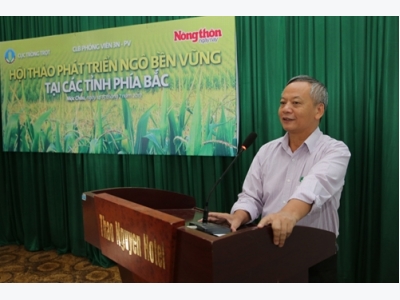Northern Vietnamese corn farmers find way to sustainable development

The Department of Crop Production (DoCP) under the Ministry of Agriculture and Rural Development, with support from Croplife Vietnam, hosted a workshop on “Sustainable development of corn in northern Vietnam” in the northern mountainous province of Son La, with the aim of drawing up solutions for the sustainable development of corn production in the future, enhancing corn farmers’ income, as well as emphasising the plant’s importance in Vietnam.
Tran Xuan Dinh, deputy head of the Department of Crop Production, reported poor yield on traditional corn plantations
At the workshop, Tran Xuan Dinh, deputy head of DoCP, reported on the present status of corn planting in Vietnam. According to DoCP, in recent years, more than one million hectares of lands are used for corn planting.
However, the average yield is low at 4.6 million tonnes on each hectare. This amount can only meet 40-50 per cent of the domestic demand.
Meanwhile, recently, corn import prices have sharply decreased, leading to heavy imports to Vietnam. In 2016, Vietnam imported 8.3 million tonnes of corn, which has put further pressure on domestic corn famers.
The Institute of Policy and Strategy for Agriculture and Rural Development (IPSARD) forecasted that the animal feed demand will rise in Vietnam by 2020, by when domestic corn planting may not be able to meet the increasing demand.
Besides, tax imposed on corn imports is likely to decline in the future. All of these will create more intense competition among domestic and foreign corn farmers.

GM corn has already been harvested this year
Croplife Vietnam said that developing genetically modified (GM) corn plants is an important solution for Vietnamese agriculture. GM corns will bring about higher yield, while limiting the damage from pests and weeds. In addition, GM corns help farmers reduce input costs and negative impacts on the environment as these kinds of corn plants do not require large amounts of pesticides and herbicides.
Duong Gia Dinh, head of the Son La Plant Protection Department, said that the province is compiling a policy to encourage GM corns, as they have a much higher yield compared to other common corn types planted in the past. For example, GM corns grown in Co Noi commune, Mai Son district, Son La province, yield 12 tonnes on each hectare.
“With GM corns, farmers can increase the yield on each hectare, while cutting back on herbicides,” Le Dang Dung, a participant in the agriculture extension activities in the province, said.

GM corns make a convincing case with higher yield, lower costs, and better quality
Nguyen Van Tien, a farmer in Loong Phieng, Yen Chau district, Son La province, also talked about his experience with GM corns.
Last year, he planted Dekalb Genuity corn of Dekalb Vietnam Co., Ltd. (a company specialising in GM corns) on part of his farm and the positive results encouraged him to switch entirely to GM corn this year.
“Using GM corns not only induces higher yield, but it also reduces costs by about 30 per cent, as herbicides and pesticides are such a major expense in production,” Tien said.
Có thể bạn quan tâm
 Fruit and vegetable exports significantly increased with an estimate of over US$ 3 billion
Fruit and vegetable exports significantly increased with an estimate of over US$ 3 billion With a monthly average growth rate of 30%-40% compared to the same period last year, the fruit and vegetable exports are estimated at over US$ 3 billion.
 Post-harvest technologies needed to increase farm produce competitiveness
Post-harvest technologies needed to increase farm produce competitiveness Using post-harvest technologies is crucial to increase the competitive edge of farm produce, heard a recent workshop in Ho Chi Minh City.
 Fruit, vegetable prices in Vietnam pressured from strong supplies
Fruit, vegetable prices in Vietnam pressured from strong supplies As consumers enjoy fresh, local fruit and vegetables this summer, farmers and producers can expect lower earnings from the fruits of their labour